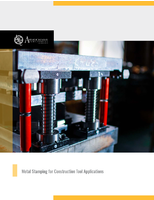Car Radiator Gaskets with Stable Sizing and Positive Sealing
Learn if rubber might be your best solution for components in critical applications.
Minneapolis, Minn., —Robinson Rubber Products, a designer, developer and manufacturer of custom-molded rubber products, extruded rubber products and precision rollers, has several new capabilities to bond molded rubber components to your parts to deliver superior performance. Bonding rubber to your part can also eliminate secondary operations and extra components, plus reduce weight and costs.
Most car radiator gaskets are molded rubber, but not all gaskets are created equal. Poor rubber formulations and shortcuts in processing proved to be quite expensive for one prominent U.S. automaker. After their supplier of radiator gaskets went out of business, this manufacturer switched sourcing to a large international company with plants in the U.S. and Mexico. Like most car radiators, this manufacturer’s design employs the classic tube-and-fin heat exchanger section, made from aluminum tubes brazed together, with plastic end caps on the top and bottom to allow for cooling fluid filling and draining. Each one of these plastic headers is sealed up against the tube-and-fin radiator through the use of a rectangular rubber perimeter gasket. This rubber gasket is approximately 19 inches by 3 inches and weighs only 23 grams, so it is flimsy, not rigid. The gasket is positioned between the aluminum header and the plastic header and the whole assembly is clinched together to provide the sealing force.
Every manufactured radiator gets tested following assembly, and with the new supplier’s gaskets, there was a high frequency of leaks. Because the assembly is clinched together, leaky radiators cannot be disassembled and repaired. These radiators have to be discarded. While this was expensive and wasteful, the bigger issue was that the automobile assembly line was idled because of insufficient radiator supply.
An examination of the problem revealed consistent, defect-free parts would be difficult to produce because of a number of problems endemic at the factory:
• Tears in the delicate sealing lip that are too small to see when “eyeballed” would leak.
• Gaskets not completely filled in during molding would leak.
• Excess flash that is not trimmed properly would cause leaking.
• Molded-in flash would impair cinching and would cause leaking.
• Even when their parts passed inspection on the above points, the biggest issue was that the rubber formulation and process design caused the gaskets to shrink over time. Gaskets not installed within a short time frame shrunk and did not seal the radiator.
To sort out the shrunken, torn, or other contaminated, defective gaskets, the car manufacturer set up a three-pronged QA approach for problem containment:
1. Gaskets were inspected at the rubber manufacturer’s plant prior to packaging.
2. A third party inspection was done off-site. Gaskets that passed this inspection were then shipped to the car manufacturer.
3. The car manufacturer implemented a third level of inspections at their site prior to installing the gaskets.
Needless to say, this approach of “sorting in the quality” was far from optimal, providing no guarantee that all leaking problems would be eliminated. And there was no way it could fix the shrinking problem. After a call to Robinson Rubber, Jay Beck, President, quickly assessed the big picture.
“A bad process design and an unstable rubber formula were the roots of the problem, and were further sabotaged by using a shuttling press. It’s amazing any of the parts were usable as the whole system was flawed from the beginning,“ states Beck.
After testing some new rubber formulations, Robinson Rubber quickly supplied the auto manufacturer with new gasket prototypes. Gaskets were allowed to “age” for 6 weeks to verify dimensional stability, and not one of them shrunk. “We were able to source our special formulation and our process design to one of our Chinese partners to keep production costs down. Our production was up and in full swing within 6 months of getting the call,” says Beck. The original gasket supplier at the Mexican plant was still struggling with the problem after 18 months.
The car manufacturer has stated that Robinson Rubber was quick to delve into the process design and rubber formulation to deliver a working solution. “Their manufacturing excellence has delivered consistent product without defects of any kind for literally millions of gaskets now, and they did it quickly.”
If you are an engineer struggling with trying to come up with components that will perform multiple functions in challenging conditions, check out rubber’s capability to bond to a variety of substrates, eliminate parts and lower assembly costs. A Polymer and Material Selection Guide is also available.Â
To learn more, email sales@robinsonrubber.com, visit www.robinsonrubber.com, or call toll-free 1-877-619-2825 or 763-535-6737 for more information.
About Robinson Rubber
Located in Minneapolis Minnesota, Robinson Rubber is a privately owned company specializing in custom rubber formulation, custom molded rubber products, precision rubber rollers and extruded rubber products used by OEMs and industrial companies. They specialize in complex components that include multiple inserts, homogenous parts and rubber bonded to metal and other substrates. The company also provides innovative component and prototype design, precision assembly and special formulated rubber compounds.




